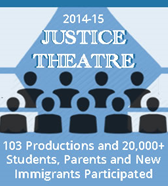Tell the Chief Judge what you think about online publication of criminal court information
Update: Extension of deadline to October 1, 2015. In light of the interest shown in the issues raised by the Consultation Memo, the Chief Judge has extended the time for members of the public to make written submissions. Comments are now sought on or before October 1, 2015.
By the Provincial Court of British Columbia
Cross-posted from eNews

The B.C. Provincial Court appears to be the only criminal trial court in Canada that provides remote online access to adult criminal court case information. You can access accused persons’ names, charges, bail orders and sentences through Court Services Online (CSO).
Online access like this raises unique tensions between fundamental principles of open courts, the presumption of innocence, and the extent to which personal information should be widely circulated when the outcome of a criminal charge is something other than conviction. The Court’s current policy is not to display case information on CSO after a case has ended if the case has resulted in a stay, withdrawal of charges, or an acquittal or dismissal. The Chief Judge is also considering whether to adopt a policy not to display information about cases that have resulted in “peace bonds” under section 810 of the Criminal Code.
Because there has not been a broad public discussion about what the limits on online publication of criminal case information should be, the Chief Judge invites members of the public, including the media, to comment on these aspects of judicial policy. A Consultation Memorandum has been posted to the Provincial Court website. It outlines the issues and asks for your views. Your comments and discussion will help the Chief Judge determine whether these policies need adjusting and whether they achieve an appropriate balance between openness and privacy considerations.
The Consultation Memorandum also deals with another issue. Members of the media have found that CSO blocks access to case information whenever a publication ban is made. The memorandum explains how publication bans work on CSO and why this blocking happens. The Chief Judge also invites comment on this policy and suggestions for reasonable alternatives.
Please read the Consultation Memorandum to find:
- information about the policies limiting access to case information when a stay, withdrawal, acquittal or dismissal has been entered;
- reasons for considering a change to include peace bonds, options for change; and
- information about the effect of publication bans on the information available on CSO.
Then please send your comments by September 18, 2015 to:
OR
CSO Policy Consultation
Attention: Mr. Gene Jamieson, Q.C., Senior Legal Officer
Office of the Chief Judge, Provincial Court of British Columbia
337 – 800 Hornby Street, Vancouver, B.C.
… and share them on


